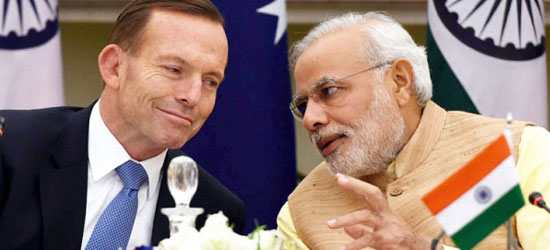
Australian Prime Minister, Tony Abbott, sealed a civilian nuclear deal to sell uranium to India on Friday and also offered to increase the supply of conventional fuel to help overcome the chronic shortage.
"We signed a nuclear cooperation agreement that Australia expects India to do the right thing in this area, as it has done in other areas," Abbott told reporters after he and Indian Prime Minister Narendra Modi signed a security pact sell uranium for peaceful power generation.
"So we're happy to trust in India our uranium in months, years and decades."
The nuclear agreement is a step towards India gain international acceptance for its nuclear program despite not ratify the nuclear non-proliferation treaty, and follows similar agreements with the United States and France.
It will also help to end lingering mistrust between the former British colonies, which share only A $ 15 billion in annual trade, a fraction of approximately A $ 150,000,000,000 of Australia trade with China.
Talks to the Civil Nuclear Cooperation Agreement after Australia began about two years ago lifted a longstanding ban on selling uranium to energy-hungry India.
"Australia can play a long-term uranium to India the role of a trusted provider," a brief description of the covenant issued by the Ministry of Foreign Affairs of India, said.
India faces sanctions after testing nuclear weapons in 1998, but the restrictions have eroded after an agreement between the United States of 2008, which recognized its growing economic weight, as well as safeguards against the diversion of civilian nuclear fuel for military purposes
India is the first customer to buy uranium from Australia without being a signatory to the nuclear non-proliferation treaty.
The agreement, which is criticized by environmentalists and nuclear activists, was well received by the Australian uranium mining company Toro Energy.
Toro Energy has environmental approvals for a uranium project in Western Australia and is in initial talks with Indian companies for investment.
"This opens the opportunity for negotiations on new mines are opening," said CEO Energy Toro Vanessa Guthrie in India during the visit of Abbott.
"We are looking for a long-term strategic partner that will have a view of 20-25 years and in return ensure long-term supply of uranium to India counterparts," Guthrie told Reuters.
COAL CRISIS
The leaders also agreed to work towards "long-term supply, sustainable and reliable resources on the basis of Australia's energy needs India" - including increased sales of conventional fuels such as coal and natural gas to India.
Before a meeting with Abbott organized by the chambers, a group said India should make use of Abbott's visit to find more coal imports in a time when power plants in India are running a critical shortage of fuel.
With two thirds of the power plants fired by coal India and the latest data show that half of them to a week of action, drawing on Australia's coal reserves is a more pressing than the need to access uranium.
Nuclear energy accounts for only 3 percent of output, compared to 3.7 percent three years ago.
"While Coal India may be asked to step up production, increasing demands make it imperative to go for more imports ... and what better source of Australia whose senior leadership coupled with strategic relationship with India, "Rana Kapoor, chairman of ASSOCHAM business chamber said in a statement.
The Australian government approved a project in July to $ 16.5 billion coal and rail in the province of Queensland by the Indian firm Adani Mining Pty Ltd, controlled by billionaire Gautam Adani.
However, nuclear energy is key to future energy plans in India, where a quarter of the population of 1.2 billion have little or no access to electricity, a situation Modi says he will address.
India operates 20 mostly small reactors at six sites with a capacity of 4,780 MW, or 2 percent of its total power capacity, according to the Nuclear Power Corporation of India Limited. The government expects to increase its nuclear capacity to 63,000 MW by 2032 by adding about 30 reactors with an estimated cost of $ 85 billion.
It currently has nuclear power agreements with 11 countries and imports uranium from France, Russia and Kazakhstan.






















